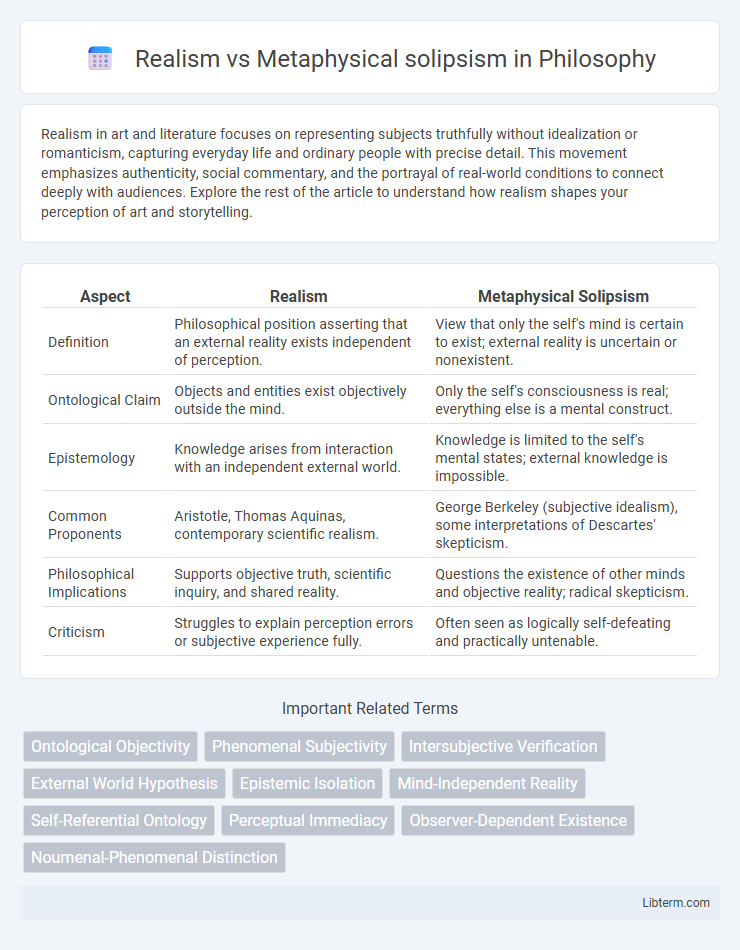Realism in art and literature focuses on representing subjects truthfully without idealization or romanticism, capturing everyday life and ordinary people with precise detail. This movement emphasizes authenticity, social commentary, and the portrayal of real-world conditions to connect deeply with audiences. Explore the rest of the article to understand how realism shapes your perception of art and storytelling.
Table of Comparison
| Aspect | Realism | Metaphysical Solipsism |
|---|---|---|
| Definition | Philosophical position asserting that an external reality exists independent of perception. | View that only the self's mind is certain to exist; external reality is uncertain or nonexistent. |
| Ontological Claim | Objects and entities exist objectively outside the mind. | Only the self's consciousness is real; everything else is a mental construct. |
| Epistemology | Knowledge arises from interaction with an independent external world. | Knowledge is limited to the self's mental states; external knowledge is impossible. |
| Common Proponents | Aristotle, Thomas Aquinas, contemporary scientific realism. | George Berkeley (subjective idealism), some interpretations of Descartes' skepticism. |
| Philosophical Implications | Supports objective truth, scientific inquiry, and shared reality. | Questions the existence of other minds and objective reality; radical skepticism. |
| Criticism | Struggles to explain perception errors or subjective experience fully. | Often seen as logically self-defeating and practically untenable. |
Introduction to Realism and Metaphysical Solipsism
Realism posits that an objective reality exists independently of human perception, asserting that the external world and its entities have a definite existence regardless of our awareness. Metaphysical solipsism, in contrast, argues that only one's mind and experiences are certain to exist, with the external world and other minds potentially being illusions or constructs of consciousness. These opposing views highlight fundamental debates in epistemology and ontology about the nature of reality and the limits of human knowledge.
Philosophical Foundations of Realism
Realism asserts the existence of an objective reality independent of the mind, grounded in the belief that physical and abstract entities have real, mind-independent properties. Its philosophical foundations emphasize empirical evidence and logical coherence as means to access and understand this reality. In contrast, metaphysical solipsism posits that only one's own mind is certain to exist, challenging the realist notion by denying the independent existence of an external world.
Core Principles of Metaphysical Solipsism
Metaphysical solipsism asserts that only the self's mind and its experiences are certain to exist, denying the independent reality of the external world and other minds. This philosophy emphasizes radical subjectivity, where all phenomena are considered mental constructs rooted in the solipsist's consciousness. Realism, contrastingly, affirms the existence of a reality independent of perception, upholding the objective nature of external entities beyond individual experience.
Ontological Differences Between Realism and Solipsism
Realism asserts the independent existence of a mind-independent world where objects and events possess an objective reality regardless of perception. Metaphysical solipsism posits that only the self and its mental states are certain to exist, denying the ontological status of an external world outside the individual's consciousness. These ontological differences highlight realism's commitment to an external, observer-independent reality versus solipsism's exclusive emphasis on the self as the sole irreducible entity.
Epistemological Implications: Knowing Reality
Realism asserts that an external reality exists independently of perception, grounding knowledge in objective experience and empirical evidence. Metaphysical solipsism challenges the existence of anything beyond one's own mind, raising doubts about the possibility of knowing an external world or other minds. Epistemologically, this contrast underscores fundamental questions about the source, certainty, and limits of human knowledge regarding reality.
Arguments Supporting Realism
Realism is supported by the argument that an external world exists independently of individual perception, as evidenced by the consistency and predictability of natural laws across different observers. Empirical verification through sensory experience and scientific experimentation further strengthens the position that reality is objective and not solely a construct of the mind. The intersubjective agreement among diverse observers on physical phenomena challenges metaphysical solipsism's claim that only one's own mind is certain to exist.
Critiques and Challenges to Metaphysical Solipsism
Metaphysical solipsism faces significant critiques regarding its epistemological isolation, as it denies the independent existence of an external reality, complicating the verification of knowledge beyond one's own mind. Realism challenges solipsism by emphasizing the objective existence of a reality independent of perception, supported by intersubjective verification and consistent external phenomena. Critics also argue that solipsism is self-defeating, as its assertion cannot be meaningfully communicated or tested outside the solipsist's own consciousness.
Realism vs Solipsism: Impact on Science and Knowledge
Realism asserts that an objective reality exists independently of human perception, enabling scientific inquiry to uncover universal truths through empirical evidence and observation. In contrast, metaphysical solipsism posits that only one's own mind is sure to exist, undermining the basis of external empirical validation and posing challenges to the collective accumulation of scientific knowledge. The tension between realism and solipsism directly impacts epistemology and methodology in science, influencing how knowledge claims are validated and accepted within the scientific community.
Contemporary Debates and Philosophical Discourse
Contemporary debates between Realism and Metaphysical Solipsism pivot on the ontological status of external reality versus the primacy of individual consciousness, with Realism asserting an independent world accessible through perception, while Solipsism questions the existence of anything beyond one's own mind. Philosophical discourse scrutinizes epistemic justification, often challenging Realism's assumptions through arguments about the limits of subjective experience and the problem of other minds. The ongoing dialogue incorporates advancements in cognitive science and phenomenology, enriching the analysis of consciousness and reality within metaphysical frameworks.
Conclusion: Bridging Realism and Solipsism
Bridging realism and metaphysical solipsism involves acknowledging the subjective nature of experience while affirming the independent existence of the external world. Philosophical frameworks such as phenomenology and transcendental idealism offer pathways to reconcile these perspectives by exploring how consciousness shapes reality without denying its objective structure. This synthesis fosters a deeper understanding of knowledge, perception, and existence beyond the binary opposition of externalism and solipsism.
Realism Infographic

 libterm.com
libterm.com